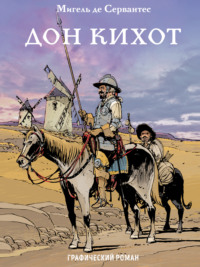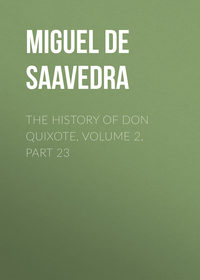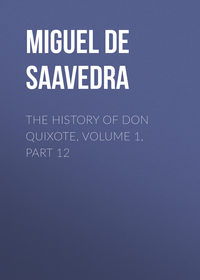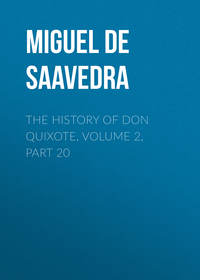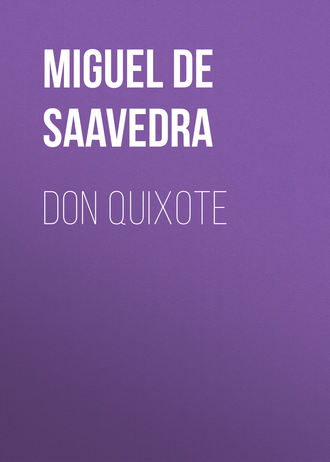 полная версия
полная версияDon Quixote
The two gentlemen pressed Don Quixote to come into their room and have supper with them, as they knew very well there was nothing in that inn fit for one of his sort. Don Quixote, who was always polite, yielded to their request and supped with them. Sancho stayed behind with the stew. and invested with plenary delegated authority seated himself at the head of the table, and the landlord sat down with him, for he was no less fond of cow-heel and calves' feet than Sancho was.
While at supper Don Juan asked Don Quixote what news he had of the lady Dulcinea del Toboso, was she married, had she been brought to bed, or was she with child, or did she in maidenhood, still preserving her modesty and delicacy, cherish the remembrance of the tender passion of Senor Don Quixote?
To this he replied, "Dulcinea is a maiden still, and my passion more firmly rooted than ever, our intercourse unsatisfactory as before, and her beauty transformed into that of a foul country wench;" and then he proceeded to give them a full and particular account of the enchantment of Dulcinea, and of what had happened him in the cave of Montesinos, together with what the sage Merlin had prescribed for her disenchantment, namely the scourging of Sancho.
Exceedingly great was the amusement the two gentlemen derived from hearing Don Quixote recount the strange incidents of his history; and if they were amazed by his absurdities they were equally amazed by the elegant style in which he delivered them. On the one hand they regarded him as a man of wit and sense, and on the other he seemed to them a maundering blockhead, and they could not make up their minds whereabouts between wisdom and folly they ought to place him.
Sancho having finished his supper, and left the landlord in the X condition, repaired to the room where his master was, and as he came in said, "May I die, sirs, if the author of this book your worships have got has any mind that we should agree; as he calls me glutton (according to what your worships say) I wish he may not call me drunkard too."
"But he does," said Don Jeronimo; "I cannot remember, however, in what way, though I know his words are offensive, and what is more, lying, as I can see plainly by the physiognomy of the worthy Sancho before me."
"Believe me," said Sancho, "the Sancho and the Don Quixote of this history must be different persons from those that appear in the one Cide Hamete Benengeli wrote, who are ourselves; my master valiant, wise, and true in love, and I simple, droll, and neither glutton nor drunkard."
"I believe it," said Don Juan; "and were it possible, an order should be issued that no one should have the presumption to deal with anything relating to Don Quixote, save his original author Cide Hamete; just as Alexander commanded that no one should presume to paint his portrait save Apelles."
"Let him who will paint me," said Don Quixote; "but let him not abuse me; for patience will often break down when they heap insults upon it."
"None can be offered to Senor Don Quixote," said Don Juan, "that he himself will not be able to avenge, if he does not ward it off with the shield of his patience, which, I take it, is great and strong."
A considerable portion of the night passed in conversation of this sort, and though Don Juan wished Don Quixote to read more of the book to see what it was all about, he was not to be prevailed upon, saying that he treated it as read and pronounced it utterly silly; and, if by any chance it should come to its author's ears that he had it in his hand, he did not want him to flatter himself with the idea that he had read it; for our thoughts, and still more our eyes, should keep themselves aloof from what is obscene and filthy.
They asked him whither he meant to direct his steps. He replied, to Saragossa, to take part in the harness jousts which were held in that city every year. Don Juan told him that the new history described how Don Quixote, let him be who he might, took part there in a tilting at the ring, utterly devoid of invention, poor in mottoes, very poor in costume, though rich in sillinesses.
"For that very reason," said Don Quixote, "I will not set foot in Saragossa; and by that means I shall expose to the world the lie of this new history writer, and people will see that I am not the Don Quixote he speaks of."
"You will do quite right," said Don Jeronimo; "and there are other jousts at Barcelona in which Senor Don Quixote may display his prowess."
"That is what I mean to do," said Don Quixote; "and as it is now time, I pray your worships to give me leave to retire to bed, and to place and retain me among the number of your greatest friends and servants."
"And me too," said Sancho; "maybe I'll be good for something."
With this they exchanged farewells, and Don Quixote and Sancho retired to their room, leaving Don Juan and Don Jeronimo amazed to see the medley he made of his good sense and his craziness; and they felt thoroughly convinced that these, and not those their Aragonese author described, were the genuine Don Quixote and Sancho. Don Quixote rose betimes, and bade adieu to his hosts by knocking at the partition of the other room. Sancho paid the landlord magnificently, and recommended him either to say less about the providing of his inn or to keep it better provided.
CHAPTER LX.
OF WHAT HAPPENED DON QUIXOTE ON HIS WAY TO BARCELONA
It was a fresh morning giving promise of a cool day as Don Quixote quitted the inn, first of all taking care to ascertain the most direct road to Barcelona without touching upon Saragossa; so anxious was he to make out this new historian, who they said abused him so, to be a liar. Well, as it fell out, nothing worthy of being recorded happened him for six days, at the end of which, having turned aside out of the road, he was overtaken by night in a thicket of oak or cork trees; for on this point Cide Hamete is not as precise as he usually is on other matters.
Master and man dismounted from their beasts, and as soon as they had settled themselves at the foot of the trees, Sancho, who had had a good noontide meal that day, let himself, without more ado, pass the gates of sleep. But Don Quixote, whom his thoughts, far more than hunger, kept awake, could not close an eye, and roamed in fancy to and fro through all sorts of places. At one moment it seemed to him that he was in the cave of Montesinos and saw Dulcinea, transformed into a country wench, skipping and mounting upon her she-ass; again that the words of the sage Merlin were sounding in his ears, setting forth the conditions to be observed and the exertions to be made for the disenchantment of Dulcinea. He lost all patience when he considered the laziness and want of charity of his squire Sancho; for to the best of his belief he had only given himself five lashes, a number paltry and disproportioned to the vast number required. At this thought he felt such vexation and anger that he reasoned the matter thus: "If Alexander the Great cut the Gordian knot, saying, 'To cut comes to the same thing as to untie,' and yet did not fail to become lord paramount of all Asia, neither more nor less could happen now in Dulcinea's disenchantment if I scourge Sancho against his will; for, if it is the condition of the remedy that Sancho shall receive three thousand and odd lashes, what does it matter to me whether he inflicts them himself, or some one else inflicts them, when the essential point is that he receives them, let them come from whatever quarter they may?"
With this idea he went over to Sancho, having first taken Rocinante's reins and arranged them so as to be able to flog him with them, and began to untie the points (the common belief is he had but one in front) by which his breeches were held up; but the instant he approached him Sancho woke up in his full senses and cried out, "What is this? Who is touching me and untrussing me?"
"It is I," said Don Quixote, "and I come to make good thy shortcomings and relieve my own distresses; I come to whip thee, Sancho, and wipe off some portion of the debt thou hast undertaken. Dulcinea is perishing, thou art living on regardless, I am dying of hope deferred; therefore untruss thyself with a good will, for mine it is, here, in this retired spot, to give thee at least two thousand lashes."
"Not a bit of it," said Sancho; "let your worship keep quiet, or else by the living God the deaf shall hear us; the lashes I pledged myself to must be voluntary and not forced upon me, and just now I have no fancy to whip myself; it is enough if I give you my word to flog and flap myself when I have a mind."
"It will not do to leave it to thy courtesy, Sancho," said Don Quixote, "for thou art hard of heart and, though a clown, tender of flesh;" and at the same time he strove and struggled to untie him.
Seeing this Sancho got up, and grappling with his master he gripped him with all his might in his arms, giving him a trip with the heel stretched him on the ground on his back, and pressing his right knee on his chest held his hands in his own so that he could neither move nor breathe.
"How now, traitor!" exclaimed Don Quixote. "Dost thou revolt against thy master and natural lord? Dost thou rise against him who gives thee his bread?"
"I neither put down king, nor set up king," said Sancho; "I only stand up for myself who am my own lord; if your worship promises me to be quiet, and not to offer to whip me now, I'll let you go free and unhindered; if not —
Traitor and Dona Sancha's foe, Thou diest on the spot." Don Quixote gave his promise, and swore by the life of his thoughts not to touch so much as a hair of his garments, and to leave him entirely free and to his own discretion to whip himself whenever he pleased.
Sancho rose and removed some distance from the spot, but as he was about to place himself leaning against another tree he felt something touch his head, and putting up his hands encountered somebody's two feet with shoes and stockings on them. He trembled with fear and made for another tree, where the very same thing happened to him, and he fell a-shouting, calling upon Don Quixote to come and protect him. Don Quixote did so, and asked him what had happened to him, and what he was afraid of. Sancho replied that all the trees were full of men's feet and legs. Don Quixote felt them, and guessed at once what it was, and said to Sancho, "Thou hast nothing to be afraid of, for these feet and legs that thou feelest but canst not see belong no doubt to some outlaws and freebooters that have been hanged on these trees; for the authorities in these parts are wont to hang them up by twenties and thirties when they catch them; whereby I conjecture that I must be near Barcelona;" and it was, in fact, as he supposed; with the first light they looked up and saw that the fruit hanging on those trees were freebooters' bodies.
And now day dawned; and if the dead freebooters had scared them, their hearts were no less troubled by upwards of forty living ones, who all of a sudden surrounded them, and in the Catalan tongue bade them stand and wait until their captain came up. Don Quixote was on foot with his horse unbridled and his lance leaning against a tree, and in short completely defenceless; he thought it best therefore to fold his arms and bow his head and reserve himself for a more favourable occasion and opportunity. The robbers made haste to search Dapple, and did not leave him a single thing of all he carried in the alforjas and in the valise; and lucky it was for Sancho that the duke's crowns and those he brought from home were in a girdle that he wore round him; but for all that these good folk would have stripped him, and even looked to see what he had hidden between the skin and flesh, but for the arrival at that moment of their captain, who was about thirty-four years of age apparently, strongly built, above the middle height, of stern aspect and swarthy complexion. He was mounted upon a powerful horse, and had on a coat of mail, with four of the pistols they call petronels in that country at his waist. He saw that his squires (for so they call those who follow that trade) were about to rifle Sancho Panza, but he ordered them to desist and was at once obeyed, so the girdle escaped. He wondered to see the lance leaning against the tree, the shield on the ground, and Don Quixote in armour and dejected, with the saddest and most melancholy face that sadness itself could produce; and going up to him he said, "Be not so cast down, good man, for you have not fallen into the hands of any inhuman Busiris, but into Roque Guinart's, which are more merciful than cruel."
"The cause of my dejection," returned Don Quixote, "is not that I have fallen into thy hands, O valiant Roque, whose fame is bounded by no limits on earth, but that my carelessness should have been so great that thy soldiers should have caught me unbridled, when it is my duty, according to the rule of knight-errantry which I profess, to be always on the alert and at all times my own sentinel; for let me tell thee, great Roque, had they found me on my horse, with my lance and shield, it would not have been very easy for them to reduce me to submission, for I am Don Quixote of La Mancha, he who hath filled the whole world with his achievements."
Roque Guinart at once perceived that Don Quixote's weakness was more akin to madness than to swagger; and though he had sometimes heard him spoken of, he never regarded the things attributed to him as true, nor could he persuade himself that such a humour could become dominant in the heart of man; he was extremely glad, therefore, to meet him and test at close quarters what he had heard of him at a distance; so he said to him, "Despair not, valiant knight, nor regard as an untoward fate the position in which thou findest thyself; it may be that by these slips thy crooked fortune will make itself straight; for heaven by strange circuitous ways, mysterious and incomprehensible to man, raises up the fallen and makes rich the poor."
Don Quixote was about to thank him, when they heard behind them a noise as of a troop of horses; there was, however, but one, riding on which at a furious pace came a youth, apparently about twenty years of age, clad in green damask edged with gold and breeches and a loose frock, with a hat looped up in the Walloon fashion, tight-fitting polished boots, gilt spurs, dagger and sword, and in his hand a musketoon, and a pair of pistols at his waist.
Roque turned round at the noise and perceived this comely figure, which drawing near thus addressed him, "I came in quest of thee, valiant Roque, to find in thee if not a remedy at least relief in my misfortune; and not to keep thee in suspense, for I see thou dost not recognise me, I will tell thee who I am; I am Claudia Jeronima, the daughter of Simon Forte, thy good friend, and special enemy of Clauquel Torrellas, who is thine also as being of the faction opposed to thee. Thou knowest that this Torrellas has a son who is called, or at least was not two hours since, Don Vicente Torrellas. Well, to cut short the tale of my misfortune, I will tell thee in a few words what this youth has brought upon me. He saw me, he paid court to me, I listened to him, and, unknown to my father, I loved him; for there is no woman, however secluded she may live or close she may be kept, who will not have opportunities and to spare for following her headlong impulses. In a word, he pledged himself to be mine, and I promised to be his, without carrying matters any further. Yesterday I learned that, forgetful of his pledge to me, he was about to marry another, and that he was to go this morning to plight his troth, intelligence which overwhelmed and exasperated me; my father not being at home I was able to adopt this costume you see, and urging my horse to speed I overtook Don Vicente about a league from this, and without waiting to utter reproaches or hear excuses I fired this musket at him, and these two pistols besides, and to the best of my belief I must have lodged more than two bullets in his body, opening doors to let my honour go free, enveloped in his blood. I left him there in the hands of his servants, who did not dare and were not able to interfere in his defence, and I come to seek from thee a safe-conduct into France, where I have relatives with whom I can live; and also to implore thee to protect my father, so that Don Vicente's numerous kinsmen may not venture to wreak their lawless vengeance upon him."
Roque, filled with admiration at the gallant bearing, high spirit, comely figure, and adventure of the fair Claudia, said to her, "Come, senora, let us go and see if thy enemy is dead; and then we will consider what will be best for thee." Don Quixote, who had been listening to what Claudia said and Roque Guinart said in reply to her, exclaimed, "Nobody need trouble himself with the defence of this lady, for I take it upon myself. Give me my horse and arms, and wait for me here; I will go in quest of this knight, and dead or alive I will make him keep his word plighted to so great beauty."
"Nobody need have any doubt about that," said Sancho, "for my master has a very happy knack of matchmaking; it's not many days since he forced another man to marry, who in the same way backed out of his promise to another maiden; and if it had not been for his persecutors the enchanters changing the man's proper shape into a lacquey's the said maiden would not be one this minute."
Roque, who was paying more attention to the fair Claudia's adventure than to the words of master or man, did not hear them; and ordering his squires to restore to Sancho everything they had stripped Dapple of, he directed them to return to the place where they had been quartered during the night, and then set off with Claudia at full speed in search of the wounded or slain Don Vicente. They reached the spot where Claudia met him, but found nothing there save freshly spilt blood; looking all round, however, they descried some people on the slope of a hill above them, and concluded, as indeed it proved to be, that it was Don Vicente, whom either dead or alive his servants were removing to attend to his wounds or to bury him. They made haste to overtake them, which, as the party moved slowly, they were able to do with ease. They found Don Vicente in the arms of his servants, whom he was entreating in a broken feeble voice to leave him there to die, as the pain of his wounds would not suffer him to go any farther. Claudia and Roque threw themselves off their horses and advanced towards him; the servants were overawed by the appearance of Roque, and Claudia was moved by the sight of Don Vicente, and going up to him half tenderly half sternly, she seized his hand and said to him, "Hadst thou given me this according to our compact thou hadst never come to this pass."
The wounded gentleman opened his all but closed eyes, and recognising Claudia said, "I see clearly, fair and mistaken lady, that it is thou that hast slain me, a punishment not merited or deserved by my feelings towards thee, for never did I mean to, nor could I, wrong thee in thought or deed."
"It is not true, then," said Claudia, "that thou wert going this morning to marry Leonora the daughter of the rich Balvastro?"
"Assuredly not," replied Don Vicente; "my cruel fortune must have carried those tidings to thee to drive thee in thy jealousy to take my life; and to assure thyself of this, press my hands and take me for thy husband if thou wilt; I have no better satisfaction to offer thee for the wrong thou fanciest thou hast received from me."
Claudia wrung his hands, and her own heart was so wrung that she lay fainting on the bleeding breast of Don Vicente, whom a death spasm seized the same instant. Roque was in perplexity and knew not what to do; the servants ran to fetch water to sprinkle their faces, and brought some and bathed them with it. Claudia recovered from her fainting fit, but not so Don Vicente from the paroxysm that had overtaken him, for his life had come to an end. On perceiving this, Claudia, when she had convinced herself that her beloved husband was no more, rent the air with her sighs and made the heavens ring with her lamentations; she tore her hair and scattered it to the winds, she beat her face with her hands and showed all the signs of grief and sorrow that could be conceived to come from an afflicted heart. "Cruel, reckless woman!" she cried, "how easily wert thou moved to carry out a thought so wicked! O furious force of jealousy, to what desperate lengths dost thou lead those that give thee lodging in their bosoms! O husband, whose unhappy fate in being mine hath borne thee from the marriage bed to the grave!"
So vehement and so piteous were the lamentations of Claudia that they drew tears from Roque's eyes, unused as they were to shed them on any occasion. The servants wept, Claudia swooned away again and again, and the whole place seemed a field of sorrow and an abode of misfortune. In the end Roque Guinart directed Don Vicente's servants to carry his body to his father's village, which was close by, for burial. Claudia told him she meant to go to a monastery of which an aunt of hers was abbess, where she intended to pass her life with a better and everlasting spouse. He applauded her pious resolution, and offered to accompany her whithersoever she wished, and to protect her father against the kinsmen of Don Vicente and all the world, should they seek to injure him. Claudia would not on any account allow him to accompany her; and thanking him for his offers as well as she could, took leave of him in tears. The servants of Don Vicente carried away his body, and Roque returned to his comrades, and so ended the love of Claudia Jeronima; but what wonder, when it was the insuperable and cruel might of jealousy that wove the web of her sad story?
Roque Guinart found his squires at the place to which he had ordered them, and Don Quixote on Rocinante in the midst of them delivering a harangue to them in which he urged them to give up a mode of life so full of peril, as well to the soul as to the body; but as most of them were Gascons, rough lawless fellows, his speech did not make much impression on them. Roque on coming up asked Sancho if his men had returned and restored to him the treasures and jewels they had stripped off Dapple. Sancho said they had, but that three kerchiefs that were worth three cities were missing.
"What are you talking about, man?" said one of the bystanders; "I have got them, and they are not worth three reals."
"That is true," said Don Quixote; "but my squire values them at the rate he says, as having been given me by the person who gave them."
Roque Guinart ordered them to be restored at once; and making his men fall in in line he directed all the clothing, jewellery, and money that they had taken since the last distribution to be produced; and making a hasty valuation, and reducing what could not be divided into money, he made shares for the whole band so equitably and carefully, that in no case did he exceed or fall short of strict distributive justice.
When this had been done, and all left satisfied, Roque observed to Don Quixote, "If this scrupulous exactness were not observed with these fellows there would be no living with them."
Upon this Sancho remarked, "From what I have seen here, justice is such a good thing that there is no doing without it, even among the thieves themselves."
One of the squires heard this, and raising the butt-end of his harquebuss would no doubt have broken Sancho's head with it had not Roque Guinart called out to him to hold his hand. Sancho was frightened out of his wits, and vowed not to open his lips so long as he was in the company of these people.
At this instant one or two of those squires who were posted as sentinels on the roads, to watch who came along them and report what passed to their chief, came up and said, "Senor, there is a great troop of people not far off coming along the road to Barcelona."
To which Roque replied, "Hast thou made out whether they are of the sort that are after us, or of the sort we are after?"
"The sort we are after," said the squire.
"Well then, away with you all," said Roque, "and bring them here to me at once without letting one of them escape."
They obeyed, and Don Quixote, Sancho, and Roque, left by themselves, waited to see what the squires brought, and while they were waiting Roque said to Don Quixote, "It must seem a strange sort of life to Senor Don Quixote, this of ours, strange adventures, strange incidents, and all full of danger; and I do not wonder that it should seem so, for in truth I must own there is no mode of life more restless or anxious than ours. What led me into it was a certain thirst for vengeance, which is strong enough to disturb the quietest hearts. I am by nature tender-hearted and kindly, but, as I said, the desire to revenge myself for a wrong that was done me so overturns all my better impulses that I keep on in this way of life in spite of what conscience tells me; and as one depth calls to another, and one sin to another sin, revenges have linked themselves together, and I have taken upon myself not only my own but those of others: it pleases God, however, that, though I see myself in this maze of entanglements, I do not lose all hope of escaping from it and reaching a safe port."


